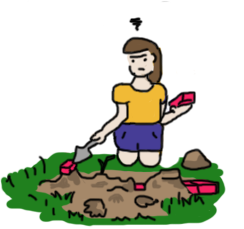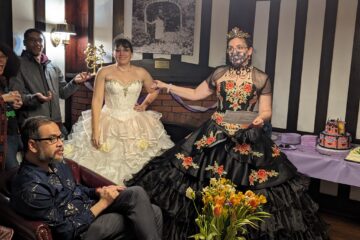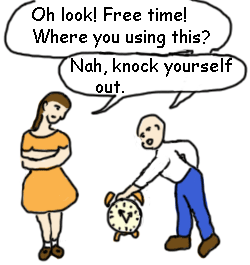The first home I remember was the East 200th Street projects, in Euclid, Ohio. Before that, we lived in a brick apartment building which my older sister pointed out to me once, and said was much nicer. Our apartment had been on the third floor, which made it technically a penthouse.
Terrisa, like most first born children, frequently emphasized how everything was better before her mother foolishly saddled her with younger siblings, but this home I didn’t remember lingered in my imagination. I dreamed for many years of the glory of a Real Apartment.
Still, I loved the 200th Street Projects, which were a series of long, two-story white aluminum-sided buildings with dark brown trim, arranged in straight rows parallel to 200th and perpendicular to the freeway. Some had pointed roofs, ours had a flat roof. Mosts of my life, they sat there, and I would glance at them as I drove past. It’s a Home Depot, now.
I don’t remember much about the time before we moved there, I was a baby, a toddler at most, but I remember my parents struggling to get IN to the projects, something most people don’t realize. The projects are hard to get into. “You gotta be poor enough to need to live there, but rich enough to pay their rent!” Dad groused. “It’s like this narrow window!” You had to be married if you were a couple. You had to have no criminal record. It helped if you were a veteran. It helped to have kids, but not too many kids.
Did I really hear all this before we moved in? Maybe I’m remembering them re-hashing their complaints after the fact? I know these were conversations not meant for my ears, twenty-something adults around the kitchen table, tossing pennies into the poker pot with cousins and getting louder as the complaints grew, then laughing at it all.
My dad had lived in a different government housing project as a kid, also in Euclid, called Briardale, which was torn down and turned into a golf course. My dad’s parents lived in the 200th Street projects, too, just one building over and a few doors down. I remember distinctly the directions to get there, out the back door, across the grassy area between buildings, down three doorways. It was the first place I was allowed to go on my own. In fact, the three of us girls went to Grandma and Grandpa’s so often we were reprimanded for not giving them any privacy.
I remember though that when I walked in the kitchen door, Grandma always had a snack for me. She’d quickly cut up a pepper or some carrots or set some graham crackers on the table, and she’d watch me eat like she was amazed by it. Grandmothers can be awesome like that.
I remember the projects as simply full of kids my age and grandparents. So many little old ladies always delighted to see a cute pair of twins! Trick-or-treat was nice and efficient with the doors so close. I never felt afraid there, though we were warned that if we left a toy outside it would be stolen quickly. And the family had suffered a great loss to crime the day we moved in.
My father had struggled and saved – a great deal was made of this – to buy a brand-new two-seater stroller for us, and it was heralded as comfortable and beautiful and far, far too expensive. The day we moved into the projects, he set it on the front stoop while he moved another box in, and someone took it by the time he returned outside. We never saw it again, and Grace and I had to make do with a second-hand stroller whose rear seat was partially broken, and caused whichever twin was in it to cry. (I ashamedly report that they tended to put Grace in the back because I complained more.)
“It’s the people in those buildings,” Terrisa pointed to the red-brick apartment buildings behind the projects, taller and grander. “That’s where bad people come from.”
It occurs to me now that the “buildings bad people come from” were the same square-red-brick as the building Terrisa touted as the penthouse of her youth.
Anyway, I was more devastated when someone stole my bike from our yard in the small town of Perry, Ohio.
The other hardship we suffered in the projects was when we were playing Cops and Robbers and I got dragged over a broken bottle no one had seen in the grass. We were playing on the side of the buildings toward the road, the narrow strip of grass before the parking lot, which for some reason we always preferred to the larger, more well-kept grassy areas between buildings. I remember the sudden, shocking pain. One minute, laughing my head off and sliding over grass, the next, hot tearing sensation and everyone around me panicking.
I got stitches, I don’t remember how many. The scar is faded now. The thing is, no one blamed the projects for the glass. It was the motorists on the freeway and East 200th, carelessly tossing trash onto our lawn, and we kids should have played on the side away from the street. (I suspect we never played in the safer area because there were more windows with potential observing parents. And danger. Kids love nothing so much as danger.)
My mother hated the projects, called them “Those barracks, those prisons.” But a child’s first remembered home is always special to them.
Our apartment was the mirror image of Grandma and Grandpa’s, with a plastic mini-partition between the kitchen and dining area with a pattern of orange and red lozenges, and the same light that hung from a cord low over the table, the same shape living room with stairs on one side.
But we made our place our own. Dad painted the living room blue with giant white stars that I still think is the best living room decor I’ve ever seen. Then Dad painted the bathroom black and went to the junkyard and bought a bucket full of broken mirror pieces for a buck, which he glued all over it. Then he painted day-glow geometric shapes between the mirrors. “Hippies used to come over just to sit in my bathtub and get high,” Dad said.
I remember playing “Spaceship” in the bathroom.
We left the projects because we got kicked out. Mom and Dad fought a lot, and if the cops come to your door more than once, well, you get kicked out. Another thing I don’t think people realize about the projects. There’s a long waiting list of people willing to come and pay the rent. There’s no reason to put up with someone who causes problems. Far from hotbeds of criminal activity, the projects have no time for you if you don’t behave. It’s honestly the only experience I’ve had that’s like a Homeowner’s Association. There were rules about what kind of curtains you could have and what you could have outside your door (pretty much nothing.)
We moved in with my mother’s parents, who kindly moved into the rental unit of their duplex so we could have the main unit. Dad joined the laborer’s union and served his apprenticeship and pretty soon had enough money for a nice new station wagon and we moved out to Perry, Ohio, where a nuclear power plant was about to be built, and the union had a job ready.
I was brattilly disappointed to live on a street with sidewalks lined with trees. (I’d wanted a porch swing! And the yard wasn’t as nice as Grandma and Grandpa’s!) I dreamed of apartments, and being an easy walk to grandparents, and to this day, as small a percentage of my life I spent there, I get furious when people talk negatively about government housing.
We need more. We have a tiny fraction of what used to exist, and the need has only gotten greater. People need a place they can afford to stay with dignity. A place where their kids can play. Please support government housing projects.


